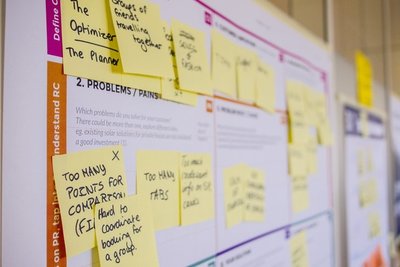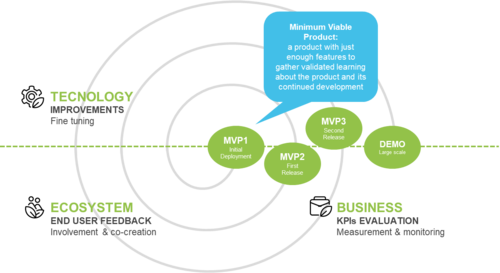IoF2020's handling of Use Cases is focused on real added value for farmers and stakeholders from the entire agri-food chain.
A challenging context
IoF2020 is one of the biggest projects ever carried out in Europe. Since 2017 within this umbrella project structure, 19 Use Cases run on parallel performance. The project carries out different actions for continuous interaction and leveraging of synergies, but Use Cases are managed by different teams, and pursue specific and individual targets for deployment. The recent approval of new additional 14 Use Cases, no doubt strengthens future capabilities of the project to really impact the European Digitalisation through Internet of Things, but also multiplies the challenges derived from the handling of such a complex and multilateral project.
Considering this complexity, IoF2020 could have chosen a classic and less innovative way for project management. Most of the projects are still managed following a predictive planification, meaning that the final success of projects majorly depends on early assumptions. On the contrary, and following current trends on digital product development, IoF2020 uses a LEAN project management. Specifically, LEAN project management root on manufacturing industry and last decades' introduction of Continuous Improvement Process, Kaizen and similar. In project management, LEAN could be included within a group of techniques inspired by the AGILE manifesto, encouraging to give more value and satisfaction to end-users through a predisposition of acceptance of their suggestions during the entire project life.
The LEAN approach in IoF2020
How does it work in IoF2020? Is it compatible with such a big project, bearing in mind that an agreement, including a detailed work plan, was signed with European Commission just before its start?
Well, the last question still has to be answered as final results can only be evaluated when the project will be finished. But no doubt that this is a paramount topic in IoF2020, and important efforts are devoted for assuring its success. Hence, we apply an iterative and incremental development process. By every Use Cases, Minimum Valuable Products are released cyclical at the end of each year. These are operative versions that are tested for their acceptance. From one version to the next one important increments of usability are incorporated. Annual iterations imply a feedback gathering from end-users, adding new features or modifying previous ones.
Developing ad-hoc tools
To support this scheme of collaboration with end-users, IoF2020 relies on certain strategies and instruments. For instance, Use Cases which belong to the same agricultural sector are headed by three “Chairs”: technical, business and ecosystem. The last two provide help to the Use Cases to suit market and external stakeholder`s requirements.
Besides Business Support, the IoF2020 team has designed the following tools to carry out the collection of impressions and expectations on each iteration:
- User Acceptance Testing & Usability Questionnaire for practical user of the service or product;
- User Acceptance Questionnaire in a short form for potential end-users just giving feedback on the acceptance of the general idea of a solution;
- Integrated usability testing via a software run on MVPs when they are used by test users.
Some of these tools have been already used in the first iteration after MVP1 in early 2018 and the rest will be used between the second and third cycle with the 19 original Use Cases and the 14 new ones. As mentioned above, these techniques are quite new, and the teams had to get used to them. Thus, the Business Support Team carried out some training and awareness sessions about its relevance.
 The main outcomes of these efforts are foreseen in the next versions of MVPs, but there are already good examples of how these participatory and flexible methods are improving the Use Cases.
The main outcomes of these efforts are foreseen in the next versions of MVPs, but there are already good examples of how these participatory and flexible methods are improving the Use Cases.
IoF2020 LEAN approach helps market-proofing
The Use Case 2.4 is continuously exposing their Remote Milk Quality RDQ system to peer review between dairy processors and laboratory experts and has allowed them to improve the usability and precision of the applied system. The first MVP has been used by 30-40 users in 4 different testing sites. Thanks to this experience, the RDQ platform is about to be released in its first commercial version. The simplification of sample pretreatment and reduced process costs are among the strengthened objectives in this Use Case after first iterations. It also benefited from participation within its organisation team of Dutch Farmers ZLTO, ensuring that feedback from users and stakeholder of the dairy sector is permanent.
In Use Case 2.1 the main target is the Happiness of Cows and, of course, of the farmers using sensors and cloud machine learning. To successfully achieve this ambitious goal, they timely check it in intensive sessions with end-users and stakeholders. For instance, using the broad public of “Day of Agriculture” (1500 visitor), an interactive game was performed, where the participants had to find a dummy cow with GPS collar. The participants could then retrieve its location from the dashboard. It encouraged them to provide feedback on the existing dashboard and application, but also to question future plans and perspectives for grazing applications, pasture milk and emission reduction techniques (dairy industry, retail, government, farmers, agriculture advisors, etc.). This Use Case has already finished two iterations and is preparing its third MVP.
The idea also works in other areas of the agri-food chain. In Use Case 3.4 Intelligent Fruit Logistic, the use of iterations and agile approaches for the design of their smart networks through RFID chips could significantly imrpve their success expectations. The Use Case is currently at the end of the second out of four iterations. They presented the results of its first MVPs in diverse events and conferences to universities, experts from the agricultural market and other stakeholders that provided additional requirements towards the application. They combined the LEAN approach with other agile techniques, like the use of user stories, common in Scrum and Design Thinking. It perfectly allows to describe different approaches, expectations and improvement suggestions of different kinds of stakeholders.
Iof2020 is undoubtedly applying cutting edge techniques of product development and project management, in a clear contrast with the large majority of common research projects. It is a frontrunner not only in the uptake of Internet of Things in agriculture but in the way that these applications will be sustainable in the future, providing real value to farmers and stakeholders in the agri-food chain.